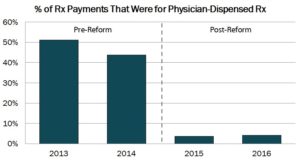

Two years after the passage of House Bill 1846, the frequency and cost share of physician-dispensed drugs decreased considerably in Pennsylvania in line with the aims of the legislation, according to a new study from the Workers Compensation Research Institute (WCRI) titled Monitoring Physician Dispensing Reforms in Pennsylvania.

“With any reform, stakeholders want to know if the reform had its intended effect and if there were any unintended consequences,” said John Ruser, WCRI’s president and CEO. “In this case, the study finds the practice of physician dispensing became much less common in the state, and prescription drug costs decreased. But the emergence of new pharmacies in the state whose revenues were predominantly from high-priced compound drugs muted the cost savings from the reforms.”
The following are among the study’s findings:
The study used detailed transaction data for physician- and pharmacy-dispensed prescriptions filled in 2013 through 2016 that were within 24 months of the date of injury. The data used for this report came from payors that represent 47 percent of all medical claims in Pennsylvania. The authors of the study are Vennela Thumula, Te-Chun Liu, and Dongchun Wang.
For more information about this study or to purchase a copy, visit https://www.wcrinet.org/reports/monitoring-physician-dispensing-reforms-in-pennsylvania.
Source: WCRI